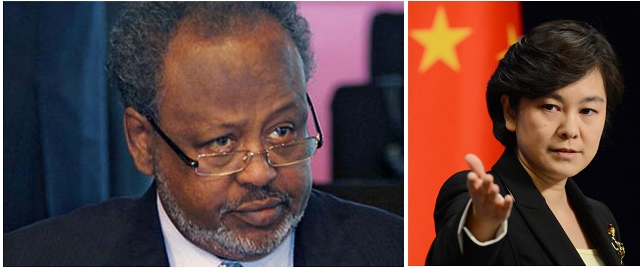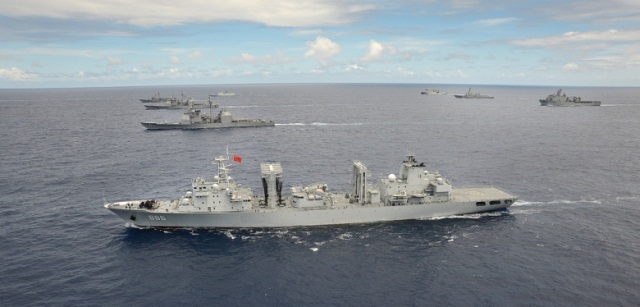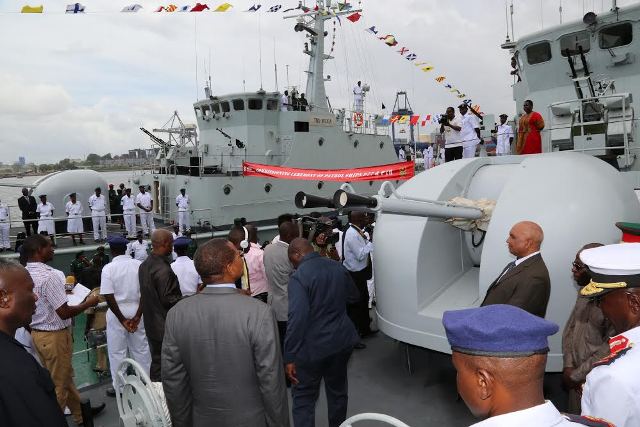Four European Nations Support African Maritime Security Conference in South Africa.
China to establish Naval Base in Djibouti, where United States, Japan, and France already have bases at the strategic horn of Africa nation.

From Left: Djibouti President, Ismail Omar Guelleh and China’s Ministry of Foreign Affairs spokeswoman Hua Chunying.
By TZ Business News Staff and Agencies.
African maritime security took centre stage as subject of discussion in South Africa this May, 2015, to address the teething issues of piracy, drug smuggling, illegal fishing and human trafficking along the continent’s vast coastline.
The event‚ from 4-7 May 2015 in South Africa‚ aimed to promote awareness of African maritime security‚ and to assist its implementation by African governments. The event was supported by the UK Foreign and Commonwealth Office‚ Defence Command Denmark‚ the Norwegian Ministry of Foreign Affairs‚ the US-based Oceans Beyond Piracy‚ and the TK Foundation of the Bahamas.
Piracy remains a threat in Africa, while drug smuggling and illegal fishing are increasing, a conference report published on the website MaritimeAfrica has said.
Additional threats come from boundary disputes‚ conflict over resources‚ smuggling and human trafficking. Illegal‚ unregulated and unreported fishing is estimated to cost sub-Saharan Africa approximately US$1 billion a year while thousands of tons of hazardous waste are dumped at sea.
Thirty-eight African countries have a combined coastline of more than 26 000 nautical miles (47 000 km). More than 90% of Africa’s trade is seaborne‚ fishing contributes to food security for more than 200 million Africans‚ and vast oil and gas potential lies off the coast. Yet this ‘blue economy’ is underdeveloped and threatened; and African states lack the ability to monitor and secure their waters‚ according to a statement by the organisers.
“Much of Africa lacks a maritime culture and is blind to the oceans’ importance to its development. More often than not it leaves others to profit from its rich marine resources‚” says Institute for Security Studies (ISS) senior researcher Barthelemy Blede.
He made the remarks during the conference on implementing Africa’s maritime security strategies. The event, organised by UK policy forum Wilton Park and the ISS‚ gathered researchers‚ diplomats and naval leaders from 21 countries and international organisations.
“Africa has a strategy to protect and benefit from its oceans; now it needs political will and committed resources to make it happen‚” ISS researcher Timothy Walker said.
“Africa’s seas should contribute to economic and environmental security‚ but are too often a story of stolen resources‚ drowning refugees and missed opportunities‚” said Walker.
The African Union’s Agenda 2063 sees the marine economy as a major contributor to growth‚ and Africa’s Integrated Maritime Strategy 2050 (AIMS 2050) recognises the vast wealth creation potential of Africa’s oceans‚ lakes and rivers.
Adopted in 2014‚ AIMS 2050 represents an important step towards securing Africa’s maritime interests. It covers fishing‚ oil & gas‚ security‚ piracy‚ pollution‚ biodiversity‚ transport and harbours; and calls for marine education and development of an African ship-building industry.
AIMS 2050 proposes a combined African maritime zone‚ and prevention of pollution and piracy. It seeks capacity building in marine defence‚ scientific research‚ tourism‚ fisheries‚ maintenance and building of harbours‚ and a pan-African fleet.
“But you can’t protect your fish‚ stop pirates or build a maritime economy only by waving a strategy‚” Blede said. “AIMS 2050 was a vital achievement‚ but governments must now show political will‚ identify priorities and start delivering on the maritime strategy.”
Maritime strategies adopted by West African and southern African states are important building blocks towards effective implementation of AIMS 2050. East Africa has a strategy under development. However‚ maritime threats are transnational so collective action is essential. No single country can secure its maritime domain on its own‚ Blede said.
Chinese Naval Base in Djibouti
In another development, the Government of Djibouti in north eastern African is holding discussions with China which intend to lead to the establishment of a naval base on the Horn of Africa, according to news reports.
According to Djibouti’s president, Ismail Omar Guelleh, “discussions are ongoing” with China for a potential military base off the coast of the small African country, located on the strategically important Horn of Africa, along the heavily trafficked Bab-el-Mandeb Strait. The naval base will likely be set up in the port city of Obock, along the northern coast of the Gulf of Tadjoura.
According to Agence-France Presse, Guelleh added that China’s presence in the country would be “welcome.” If the negotiations are successful, Djibouti would become host to China’s first overseas military base. Per a February 2014 bilateral agreement, Djibouti gave the Chinese navy permission to use its naval facilities.
Hua Chunying, spokeswoman for China’s foreign ministry, was reluctant to discuss the topic in detail, when questioned on Guelleh’s comments by a reporter:
We have noted the relevant report. China and Djibouti enjoy traditional friendship. Friendly cooperation between the two sides has achieved constant growth over recent years, with practical cooperation carried out in various fields. What needs to be pointed out is that regional peace and stability serves the interests of all countries and meets the aspirations shared by China, Djibouti and other countries around the world. The Chinese side is ready and obliged to make more contributions to that end.
Djibouti is home to military bases for the United States, Japan, and France, among other states. Its strategic location makes it an important hub for global navies that seek to combat piracy off the Horn of Africa, in the Red Sea, and in the Gulf of Aden. The United States uses its base in Djibouti, known as Camp Lemonnier, to stage covert operations involving Remotely Piloted Aircraft (RPA) in Yemen, Somalia, and other nearby regions. Japan, meanwhile, stations just under 200 personnel there from its Maritime Self-Defense Forces for counter-piracy operations.
Recently, in late March and early April, various Chinese People’s Liberation Army Navy (PLAN) vessels evacuated Chinese and foreign citizens from Yemen after the start of the Saudi-led aerial bombardment campaign there to Djibouti. China’s Linyi and Weifang missile frigates, and Weishanhu supply ship all participated in the evacuation.
As China’s navy grows increasingly global in its operations, it has cited anti-piracy operations as one of the primary drivers of its expeditionary activity. In addition to surface ships, last year China sent its Shang- and Song-class submarines into the Indian Ocean. Most visibly, the PLAN’s 17th and 18th naval escort taskforces, comprising various amphibious landing ships, missile frigates, and supply vessels, were sent to the Gulf of Aden last year. In December 2014, China dispatched the PLAN’s 19th naval escort taskforce to Somalia, and in April 2015, it sent the 20th taskforce.
Given the increasing frequency of PLAN operations in the region and the growing number of Chinese vessels transiting the waters off the Horn of Africa and the Arabian peninsula, a permanent military installation would help China support these missions. Beyond counter-piracy, however, a long-term Chinese military presence in Djibouti will likely cause alarm, particularly for the United States and India. The United States is concerned about China’s growing global military presence while India remains concerned about China’s ability to frictionlessly project power in the Indian Ocean.
Energy security could be another possible reason China is interested in securing a permanent installation in Djibouti. This, however, is less convincing. Despite their general strategic importance as heavily trafficked sea lanes, the waters of the Red Sea and the Bab-el-Mandeb Strait, according to 2013 data, lag well behind the Straits of Hormuz and Malacca in terms of their criticality to China’s energy import security. 18 percent of China’s imported natural gas and 43 percent of its imported crude oil transits the Strait of Hormuz. Malacca, similarly, is a transit route for 30 percent of China’s natural gas imports, and more spectacularly, 82 percent of China’s crude oil. Meanwhile, just 4 percent of China’s natural gas imports and 3 percent of its crude oil imports transit the Bab-el-Mandeb.
Pan African Peace Keeping Force on Verge of Formation
Reports from Harare indicate in the meantime, that formation of a Pan-African peace peacekeeping force may be closer to reality in the wake of a meeting in Zimbabwe of African Union (AU) ministers of defence to review progress made in the establishment of an African Standby Force (ASF).
According to The Zimbabwe Herald newspaper, the two-day meeting kicked off on Monday [May 11, 2015], with defence, peace and security experts from 54-member states set to assess progress made towards the operationalisation of the standby force.
A News Day report quoted Zimbabwe National Army Major-General Sibusisiwe Moyo as calling for the strengthening of security co-operation among member states to enable the continent to respond quickly and effectively to crises.
“Better co-ordination will help speed up the delivery of assistance during crises,” Moyo was quoted as saying. The idea of the ASF was first mooted in 2008. December has been set as the new deadline for the setting up of the military force. The military force would be responsible for maintaining peace and stability on the continent and to intervene in regional hotspots, the Herald said.
Meanwhile, the AU has dispatched a high-level delegation to Burundi to help find a peaceful solution to the current political crisis in the east African country.
In a statement, the AU reiterated its appeal for dialogue and restraint in order to find a consensual solution to the crisis. Burundi has been hit by protests against President Pierre Nkurunziza’s bid for a third term in power.







